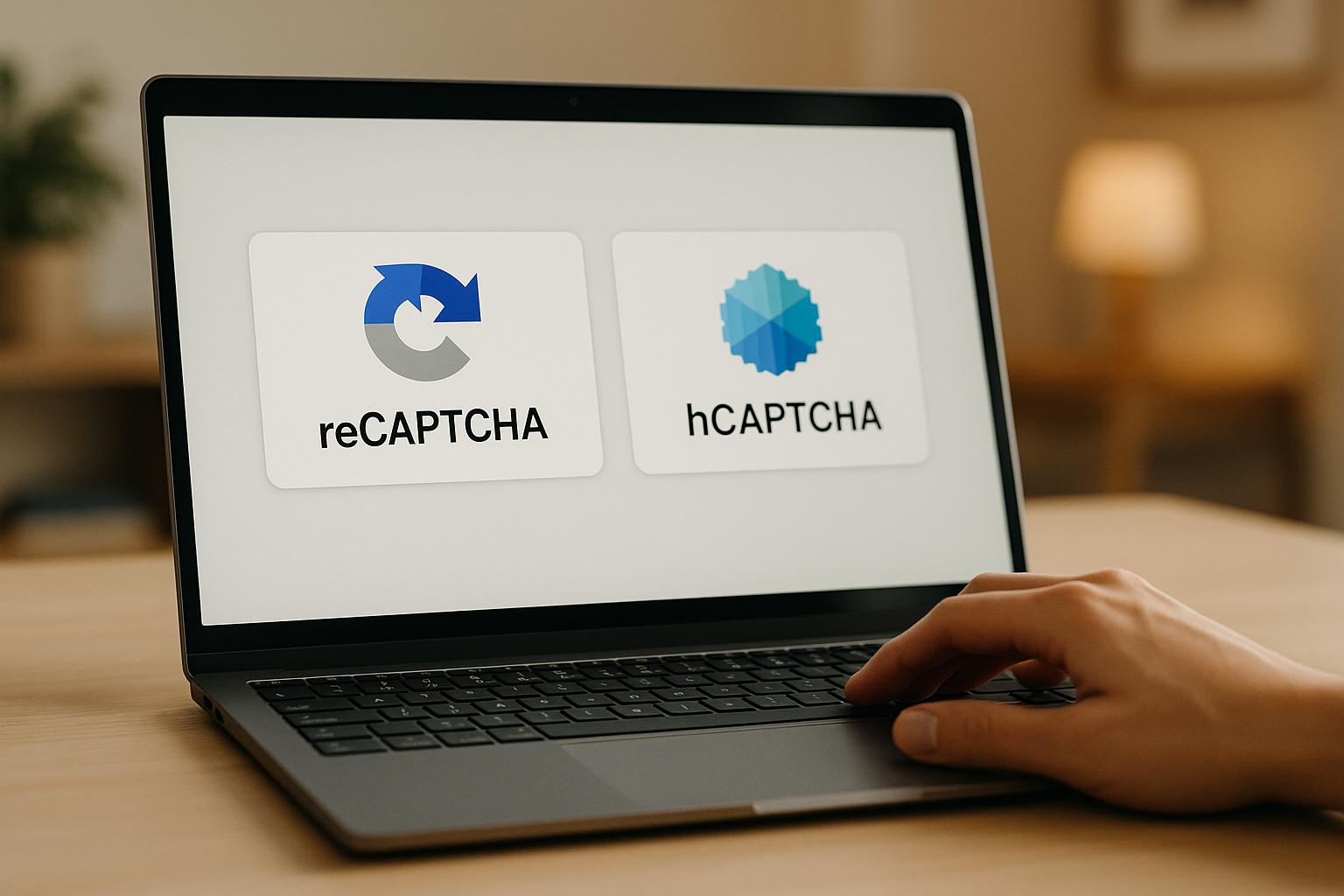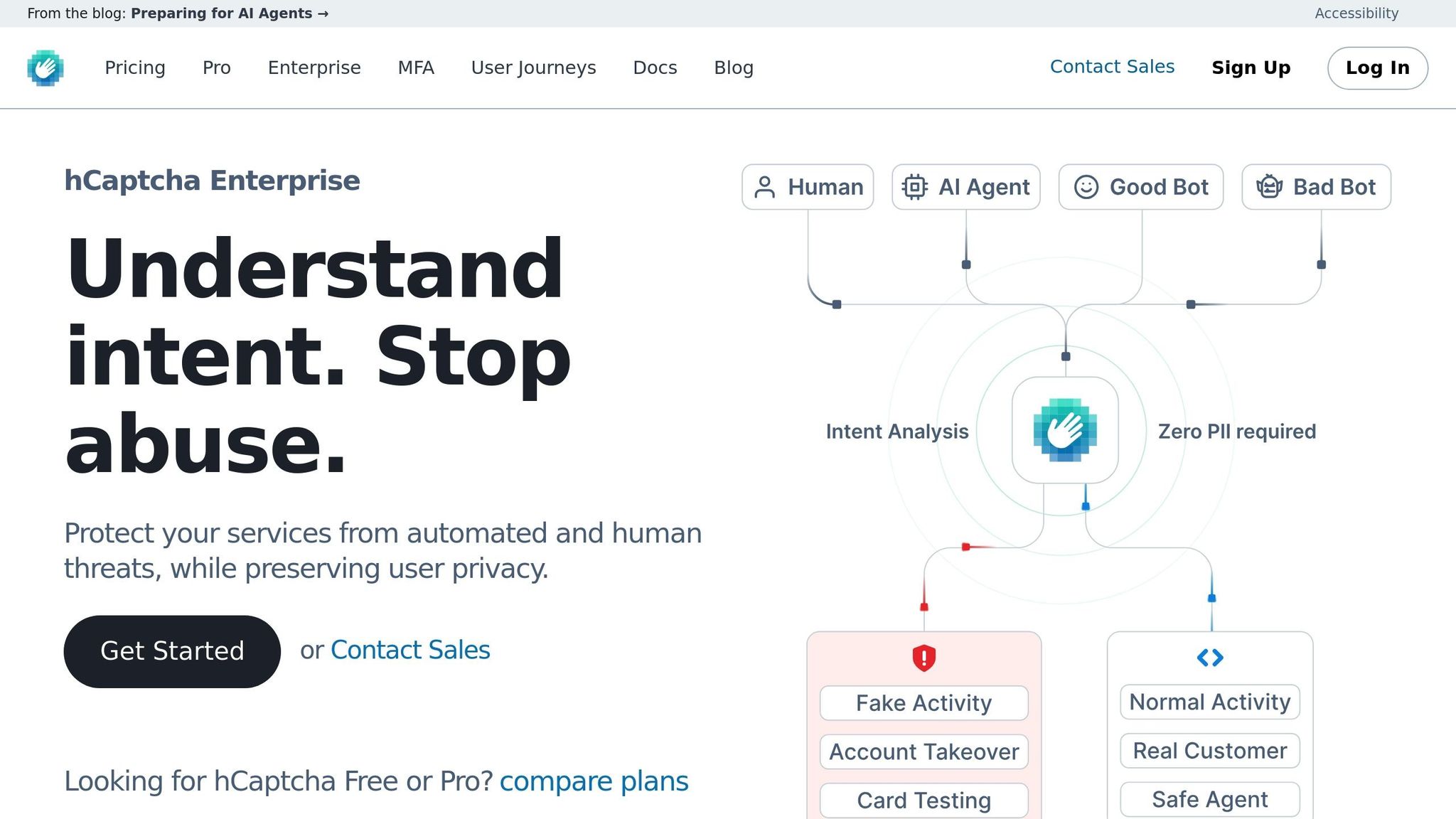How to Choose Between reCAPTCHA and hCAPTCHA

CAPTCHAs are essential for protecting online forms from bots, but choosing between reCAPTCHA and hCAPTCHA depends on your priorities: privacy, user experience, or cost. Here’s a quick breakdown:
- reCAPTCHA: Developed by Google, it offers advanced bot detection using behavioral analysis and AI. It’s free for small websites but collects significant user data, which may raise privacy concerns.
- hCAPTCHA: Focuses on privacy with minimal data collection, making it easier to comply with regulations like GDPR. It’s free for most users and has a paid version for businesses needing extra features.
Key differences:
- User Experience: reCAPTCHA uses invisible verification and simple checkboxes but can prompt image challenges. hCAPTCHA offers larger touch targets and text-based alternatives.
- Privacy: reCAPTCHA collects more user data, while hCAPTCHA minimizes it, prioritizing compliance.
- Cost: Both have free tiers, but hCAPTCHA’s paid plans are more budget-friendly for high-traffic sites.
- Integration: Both integrate easily, but hCAPTCHA provides more customization.
Quick Comparison
| Feature | reCAPTCHA | hCAPTCHA |
|---|---|---|
| User Data | Extensive collection | Minimal collection |
| Free Tier | Free for small sites | Free for most sites |
| Paid Plans | Higher costs for large traffic | Affordable for high traffic |
| Privacy Compliance | Requires extra steps | Simple to comply |
| Challenges | Checkboxes, image tasks | Image grids, text alternatives |
Choose reCAPTCHA for advanced bot detection or hCAPTCHA if privacy and compliance are your focus. Both work well with platforms like Reform to enhance form security and user experience.
How To Setup hCaptcha For WordPress 2020 - reCaptcha Alternative hCaptcha - reCaptcha Paid Service?

User Experience and Accessibility
Overly complicated CAPTCHAs can turn users away and lower form completion rates - a problem no business wants.
User Interaction Methods
With reCAPTCHA's checkbox, all it takes is a click. The system evaluates mouse movements and clicks to determine if you're human. If it’s unsure, it may trigger image challenges, asking users to identify objects in pictures. These image challenges, especially when unclear, can be frustrating and time-consuming.
reCAPTCHA v3 operates behind the scenes, assigning a risk score between 0.0 and 1.0 to detect suspicious behavior without requiring direct user interaction.
hCAPTCHA, on the other hand, often uses image grids for object identification but also provides text-based alternatives for users who may prefer them.
Accessibility Features
Accessibility plays a big role in ensuring everyone can use CAPTCHAs effectively. reCAPTCHA includes an audio option for users who struggle with visual challenges. When selected, a sequence of numbers or words is played for the user to type in. Its checkbox version also works with screen readers, which inform users about the CAPTCHA's purpose and status. However, if an audio challenge leads to further image-based tasks, screen reader users might find the process more cumbersome.
hCAPTCHA offers keyboard navigation and text-based challenges, which can be especially helpful for users with motor disabilities. This feature makes it easier for them to complete the CAPTCHA without relying on mouse input.
Language support is another area where these systems differ. reCAPTCHA supports a wide variety of languages for both its interface and audio challenges. hCAPTCHA, while expanding its language options, currently offers fewer choices.
For businesses using tools like Reform, accessible CAPTCHA solutions can directly impact lead quality. Features like smooth keyboard navigation and effective text-based alternatives are key to meeting accessibility guidelines, such as those outlined in the Americans with Disabilities Act (ADA).
On mobile devices, reCAPTCHA's image challenges can be tricky due to the need for precise tapping on small screens. In contrast, hCAPTCHA uses larger touch targets, which could make it more user-friendly for mobile users.
Both systems are continually improving their accessibility features, showing that user experience is about more than just stopping bots. Factors like ease of use, frustration levels, and accessibility compliance are all critical when choosing the right CAPTCHA solution for your needs. Next, we’ll dive into how these systems handle privacy and data.
Privacy and Data Handling
Privacy has become a critical consideration when selecting CAPTCHA solutions, especially with regulations like GDPR and CCPA enforcing stricter rules on how user data is managed.
Data Collection Methods
reCAPTCHA, part of Google's ecosystem, operates by quietly gathering a significant amount of data - such as IP addresses, cookies, mouse movements, and device settings - to detect bots effectively. However, this continuous and invisible data collection raises concerns about GDPR compliance, often requiring website operators to implement additional consent mechanisms to meet regulatory standards.
On the other hand, hCAPTCHA takes a privacy-focused approach. It collects minimal data, avoids retaining personal information long-term, and ensures that any collected details are anonymized promptly. Unlike reCAPTCHA, hCAPTCHA does not sell or rent user data.
Additionally, hCAPTCHA processes most data on regional servers located close to end users, enhancing data security and privacy. For enterprise clients, it even offers "Zero PII" features, allowing businesses to partially or entirely eliminate personal data from its systems.
Legal Compliance
Failing to comply with privacy regulations like GDPR and CCPA can result in steep penalties - up to €20 million or 4% of global revenue under GDPR, and up to $7,500 per incident under CCPA. Beyond avoiding fines, compliance is essential for maintaining user trust, as 87% of consumers express concerns about their privacy and desire greater control over their data.
reCAPTCHA requires significant compliance measures. Under GDPR, businesses using reCAPTCHA must obtain explicit user consent, often through cookie banners, and provide clear disclosures about its data collection practices, including links to Google's Privacy Policy. For CCPA compliance, businesses need to inform users about the data being collected, offer opt-out options for data selling or sharing, and grant access to their personal information. These requirements add administrative burdens and potential legal risks.
hCAPTCHA, by contrast, is designed to align with major privacy regulations, including GDPR, CCPA, LGPD, and PIPL. It is also enrolled in leading data privacy frameworks, and its privacy-first design minimizes cross-border data transfers, making compliance less complex.
For businesses, especially those collecting sensitive information through forms, privacy compliance is crucial. hCAPTCHA's minimal data collection approach simplifies compliance efforts, whereas reCAPTCHA demands more extensive measures, such as explicit consent mechanisms and detailed privacy disclosures.
These differences in privacy and compliance requirements highlight the broader implications for each solution's overall security and usability.
Security and Bot Detection Performance
Protecting your forms does more than just block bots - it ensures that the leads you collect are genuine, reducing fraudulent submissions and improving overall lead quality. When choosing a CAPTCHA solution, security effectiveness should be the top priority. With bots making up over 30% of all internet traffic, selecting a tool that accurately separates human users from automated threats is crucial for safeguarding your website and forms. Below, we break down how the technology behind each solution powers its bot detection and security capabilities.
Bot Detection Technology
reCAPTCHA relies on Google's advanced risk analysis engine and adaptive challenges. It uses AI-powered models to identify human behavior patterns. For example, reCAPTCHA v3 works invisibly in the background, analyzing user interactions like mouse movements, typing habits, session durations, plugins, IP addresses, and cookies. Based on this data, it generates a risk score between 0 and 1. If the system detects unusual activity, it may prompt users with additional challenges such as image recognition tasks or checkbox verifications.
On the other hand, hCAPTCHA employs dynamic AI models to generate custom challenges designed to confuse automated bots. One of its primary methods involves image classification tasks, where users label objects in visual puzzles. It also uses behavioral analysis - tracking things like cursor movements and click timing - as well as AI-based image recognition that learns from millions of interactions. To further enhance detection, hCAPTCHA incorporates IP and device fingerprinting, alongside specialized threat signatures, to group suspicious traffic while ensuring that genuine users aren’t disrupted. For a smoother user experience, hCAPTCHA offers passive and no-CAPTCHA modes, blending security with convenience.
Advanced Security Options
Both reCAPTCHA and hCAPTCHA go beyond basic detection, offering advanced configurations to address evolving threats.
reCAPTCHA Enterprise includes features like a Machine Learning Model Tuning API and support for two-factor authentication. While highly effective against straightforward automated attacks, advanced bots powered by AI and machine learning can sometimes bypass reCAPTCHA’s defenses.
hCAPTCHA, with its adaptive approach, constantly evolves to counter new bot technologies. It uses self- and semi-supervised learning, offering real-time Risk Insights to help adapt to emerging threats. Additionally, hCAPTCHA provides a passive mode and robust customization tools, ensuring that security measures stay ahead of sophisticated bot tactics.
When it comes to false positives, reCAPTCHA's invisible system is designed to minimize user friction. However, it may occasionally misclassify legitimate users - especially those using VPNs, ad blockers, or who aren’t logged into Google. hCAPTCHA, while focused on straightforward challenges for genuine users, may require extra verification for individuals with limited tracking data. Despite these nuances, hCAPTCHA has gained traction, capturing over 15% of the global market share from Google reCAPTCHA.
sbb-itb-5f36581
Integration and Pricing
When choosing between reCAPTCHA and hCAPTCHA, it’s worth considering how their integration processes and pricing structures might affect your development timeline and budget. Both solutions offer distinct features that cater to different needs.
Platform Integration
reCAPTCHA is known for its straightforward integration process, thanks to Google’s detailed API documentation. By embedding simple HTML and JavaScript, along with server-side verification, it ensures compatibility across a wide range of platforms.
hCAPTCHA takes a similar route but goes a step further by offering more control over how its challenges look and behave. Its documentation is equally thorough and supports various programming languages, making it a flexible option for developers.
Both tools also work seamlessly with no-code platforms like Reform. Reform’s built-in spam prevention features allow you to integrate either CAPTCHA solution with just a few clicks. Plus, its real-time analytics let you track how CAPTCHA affects form completion rates, helping you strike the right balance between security and user experience.
Now, let’s break down how their pricing models compare.
Cost Structure
reCAPTCHA uses a freemium pricing model. It offers a free tier that’s particularly suitable for small to mid-sized businesses. As your usage grows, costs are determined by the number of verification requests, with enterprise-level plans available for businesses with more complex needs.
hCAPTCHA, on the other hand, is free for most websites. It generates revenue by using human-solved challenges to train machine learning models. If your business prefers not to participate in this data collection, you can opt for hCAPTCHA Pro, a paid version that’s often more budget-friendly for high-traffic sites.
For U.S.-based businesses, smaller websites can typically use these tools at no cost. However, if your site handles significant traffic, it’s important to compare both pricing models to determine which aligns better with your operational needs.
reCAPTCHA vs hCAPTCHA Comparison
Here's a breakdown of key features to help you decide between reCAPTCHA and hCAPTCHA:
| Feature | reCAPTCHA | hCAPTCHA |
|---|---|---|
| User Experience | Uses an automated challenge process | Lets you adjust challenge difficulty, offering more control over user interactions |
| Privacy | Collects user data within Google's ecosystem, including cross-site tracking | Prioritizes minimal data collection and avoids cross-site tracking |
| Free Tier | Free for most small, non-enterprise websites | Supports over 1,000,000 requests per month at no cost |
| Enterprise Pricing | Costs can rise significantly as usage increases | Marketed as a more budget-friendly option |
| Integration | Works seamlessly with Google services and provides detailed API documentation | Designed as a "drop-in replacement" with broad documentation and plugins (e.g., WordPress support) |
| Data Compliance | May require extra scrutiny due to extensive data practices | Simplifies compliance with privacy regulations |
These features highlight key differences in pricing, integration, and privacy. For businesses handling high traffic, the cost disparity between the two solutions can be significant. While reCAPTCHA integrates effortlessly with Google services, hCAPTCHA shines as a flexible option that works across various platforms.
Privacy is another major factor. If your business caters to privacy-conscious users or operates in regions with strict data protection laws, hCAPTCHA's minimal data collection might be a better fit compared to reCAPTCHA's more extensive tracking.
Additionally, hCAPTCHA allows for challenge customization, giving you more control over user interactions. Both solutions integrate smoothly with platforms like Reform, enabling spam prevention features and providing real-time analytics to track their impact on conversion rates.
How to Choose the Right CAPTCHA
Picking the right CAPTCHA solution comes down to understanding your business needs, privacy concerns, and technical limitations. It’s not just about security - it’s about finding the right balance between protecting your site, maintaining a smooth user experience, meeting compliance requirements, and managing costs.
When to Use Each Solution
- Go with reCAPTCHA if you need strong bot detection. It uses advanced behavioral data to assess risks and keep bots at bay.
- Opt for hCAPTCHA if privacy is a top priority. Its approach to minimizing data collection can make compliance with regulations much easier.
These differences can guide you toward the right solution based on what matters most to your business.
Making Your Decision
To make the best choice, think about your privacy policies, website traffic, and how easily the CAPTCHA can fit into your existing systems.
- Privacy compliance: If your audience values privacy or you operate in regions with strict data protection laws, hCAPTCHA may be the better fit due to its minimal data collection. Keep in mind that Google’s reCAPTCHA requires obtaining user consent for cookies and personal data, which can add extra complexity in meeting regulations like GDPR.
- Traffic and costs: For websites with heavy traffic, pricing differences between CAPTCHA solutions can significantly affect your budget.
- Integration needs: Consider how easily the CAPTCHA can work with your platform. For example, tools like Reform offer seamless integration with CAPTCHA solutions, combining spam prevention with features like real-time analytics to enhance your forms.
FAQs
What are the key differences between reCAPTCHA and hCAPTCHA in terms of privacy and compliance with regulations like GDPR?
reCAPTCHA gathers a wide range of behavioral data and shares it with Google, which can lead to privacy concerns and complications with GDPR compliance, especially because of data transfers to servers in the U.S. In contrast, hCAPTCHA places a stronger emphasis on privacy, follows ISO 27701 standards, and aligns more closely with GDPR principles. While neither tool is automatically GDPR-compliant, hCAPTCHA is often seen as the more privacy-conscious option due to its minimal data collection and greater focus on protecting user privacy.
What should I consider when choosing between reCAPTCHA and hCAPTCHA for a high-traffic website?
When choosing between reCAPTCHA and hCAPTCHA, there are a few important aspects to weigh:
- Security and User Experience: If you're running a high-traffic site and want to reduce user friction, reCAPTCHA v3 might be the better fit. It uses behavior-based analysis to protect your site without interrupting the user flow. On the other hand, hCAPTCHA is highly effective at detecting bots but often relies on image-based challenges, which might slow down the user experience.
- Privacy: Privacy considerations can also play a role in your decision. hCAPTCHA is praised for its clear and transparent approach to data usage. Meanwhile, reCAPTCHA collects less user data overall, which could align better with your site's privacy objectives.
Ultimately, the right choice depends on what matters most for your website - whether it’s prioritizing a smoother experience, stronger privacy measures, or a balance of both.
Which CAPTCHA option, reCAPTCHA or hCAPTCHA, is more accessible for users with disabilities?
Both reCAPTCHA and hCAPTCHA aim to make their platforms accessible, but they take slightly different paths to get there. reCAPTCHA offers strong compatibility with major screen readers such as ChromeVox, JAWS, NVDA, and VoiceOver. It also includes accessible options like checkbox CAPTCHAs, which are designed to work seamlessly with assistive technologies.
On the other hand, hCAPTCHA provides features like email support specifically for users with disabilities and is actively working to enhance its accessibility. While reCAPTCHA has a longer history of integration with assistive tools, both platforms still face hurdles, particularly with keyboard navigation, and they continue to refine their features. The best choice will depend on your users' needs and how well these platforms address them.
Related Blog Posts
Get new content delivered straight to your inbox

The Response
Updates on the Reform platform, insights on optimizing conversion rates, and tips to craft forms that convert.
Drive real results with form optimizations
Tested across hundreds of experiments, our strategies deliver a 215% lift in qualified leads for B2B and SaaS companies.


.webp)








